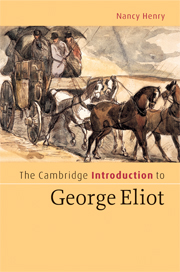Chapter 5 - Afterlife
Published online by Cambridge University Press: 05 September 2012
Summary
In the Victorian periodical press, it was common to publish articles, stories and poems anonymously or under a pseudonym. For example, Lewes wrote theatre reviews for the Leader under the name “Vivian,” and Eliot's essays in the Westminster Review were published anonymously. While insiders often knew the identities of anonymous authors, the practice allowed readers to judge contributions objectively and gave the impression of a journal speaking in one voice. On the other hand, original work might go unacknowledged unless – as George Eliot found – the veil of anonymity was lifted.
When Marian Evans Lewes published “The Sad Fortunes of the Reverend Amos Barton” anonymously in Blackwood's Magazine (Jan.–Feb. 1857), she had an additional reason for not wanting to advertise her name. Mrs Lewes was not her real (or at least not her legal) name. It was a fiction, but one that – unlike George Eliot – might distract or put off readers by calling attention to her unmarried status. So when she published Scenes of Clerical Life as a book (1858), she employed the pseudonym George Eliot partly for personal reasons and also to see what kind of response her writing would receive without preconceptions based on her identity or her gender. The strategy worked in that Scenes and her next book Adam Bede (1859) established the reputation of George Eliot so completely that even questions about the domestic life of Marian Evans Lewes could not undermine it.
- Type
- Chapter
- Information
- The Cambridge Introduction to George Eliot , pp. 104 - 114Publisher: Cambridge University PressPrint publication year: 2008



